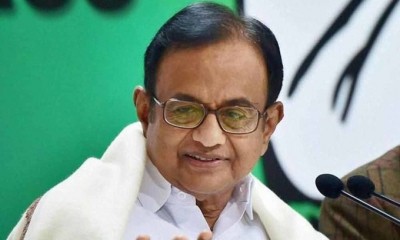
Mumbai, Senior Congress leader and former Union Finance Minister P. Chidambaram on Friday posed 20 questions on the Centre's proposed National Monetization Pipeline (NMP) intended to 'monetise' certain assets and earn Rs 6,00,000 crore revenue over the next four years.
Stating that the government should answer the questions, he demanded to know the NMP objectives and whether it was solely intended to raise the revenues over the next four years.
Referring to the criteria adopted upfront to identify the PSUs that would be disinvested or privatised during the previous UPA government, Chidambaram queried whether the same is the case with the current NDA regime.
Pointing out that for infra projects like roads/highways, a PPP policy already exists, he asked what is the difference, if any, between this (PPP) model and the one that would be adopted by the Centre under the NMP, while addressing the media in the country's commercial capital.
Moreover, if an asset is 'monetised' for 30-50 years, what is the value of the piece of paper that declares the government to be the 'owner' of that asset, what kind of asset will be returned to the government at the end of the period or would it be a "fully depreciated asset" worth practically nothing.
"Since the NMP is silent on the subject, will the government stipulate in the contract that the amount of depreciation should be put in a Depreciation Reserve Account which was used only to maintain, upgrade or add to the asset so that at the end of the lease period a valuable asset is returned to the government," Chidambaram asked.
He also sought answers on whether there will be provision in the contract to prevent asset-stripping by the lessee, the terms included in the Invitation to Bid (ITB) to ensure that the 'monetisation' process does not create monopolies or duopolies in that sector, especially to prevent such (monopolies/duopolies) emerging in the ports, airports, telecom and power sectors.
The finance expert queried whether the lessee will manage the current levels of employment and the policy of reservations, or other policies, subject to sectoral regulators, etc., in the 'monetised' asset.
Harking to the UPA which identified the Railways as a 'strategic sector', he asked what are the other sectors the Centre has identified as 'core' or 'strategic' that would be kept out of the NMP purview.
"Has the government examined the impact of implementation of the NMP on the prices of goods and services in the sector/industry concerned? What will the government or the regulator do in case prices are increased by the lessee of the 'monetized' asset," Chidambaram demanded.
Referring to the government's revelation of the expected revenue of Rs 6,00,000 crore in four years, he asked whether the government would shed light on the total capital investment in the identified assets that are expected to yield the aforesaid revenue.
"The identified assets must be currently yielding a certain revenue every year. Has the government calculated the difference between the current revenue (undisclosed) and the expected revenue (of Rs 6,00,000 crore) over a period of four years? If so, what is the difference between the two amounts each year during the four year period," Chidambaram asked.
On the government's announcement that the NMP would be co-terminus with the National Infrastructure Pipeline (NIP) that is expected to require Rs 100 lakh crore, the ex-FM sought to know how the Rs 6,00,000 crore over a four year period be sufficient to finance a Rs 100 lakh crore NIP.
Furthermore, he sought an assurance from the Centre that the expected sum of Rs 6,00,000 crore "would not be merged with general revenues or used for general expenditure".
Chidambaram further posed if the Rs 6,00,000 crore, when released, would not be diverted to partly-finance the fiscal deficit (Rs 5,50,000-crore in 2021-2022) or retiring old debts.
The Congress leader asked if the government floated a consultation paper on NMP, consulted various stakeholders including the workers or trade unions and demanded to know the outcome/minutes of these consultations.
He also asked whether the NMP was discussed in Parliament, and if not, whether the Centre plans to consult the Opposition Parties or debate in parliament.
Chidambaram said that the US is contemplating measures to contain monopolization and unfair trade practices of giants like Google, Amazon and Facebook, China has announced plans to rein in its giant tech firms and South Korea contained the influence of its huge family-controlled business conglomerates.
"Does the government intend to introduce similar measures while implementing the NMP," Chidambaram asked, saying the Centre "is obliged to answer these questions", and the media must demand replies from the government.


.jpeg)

